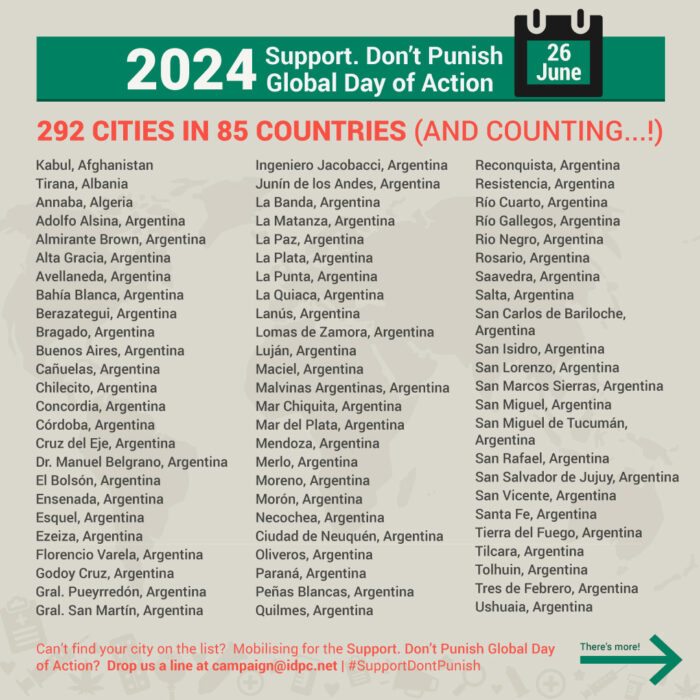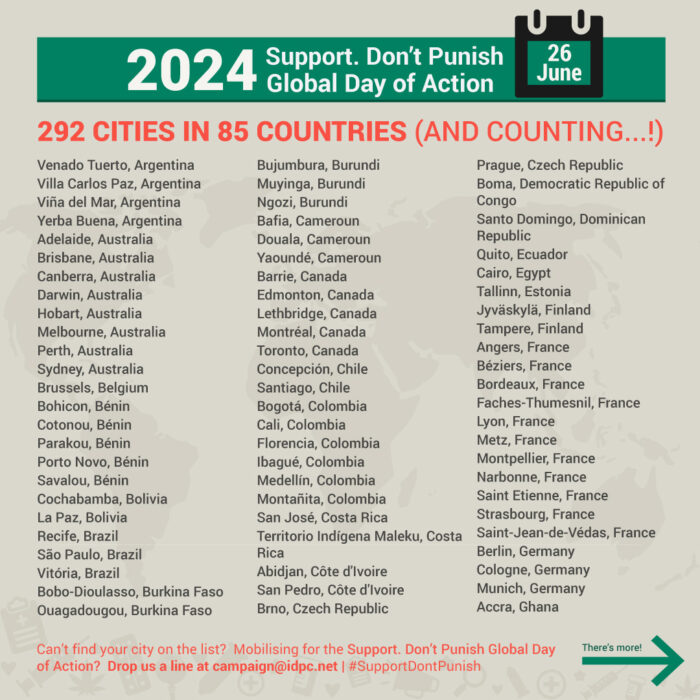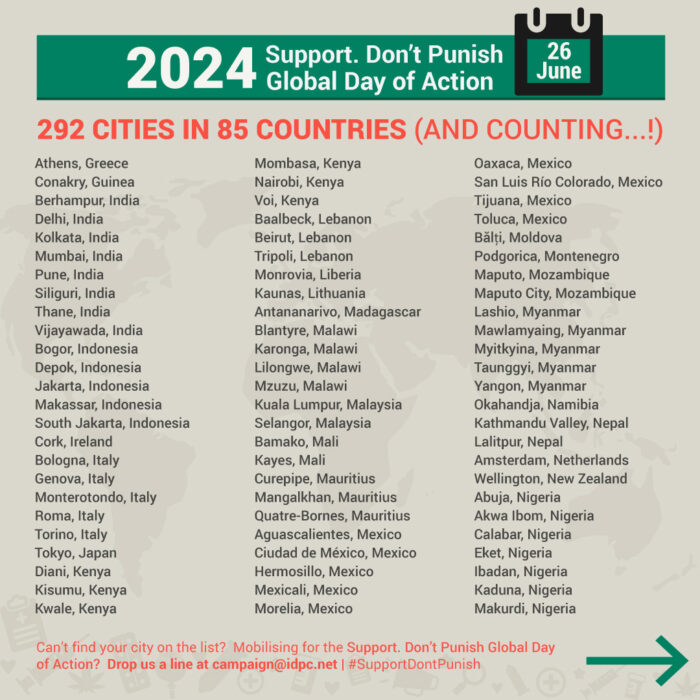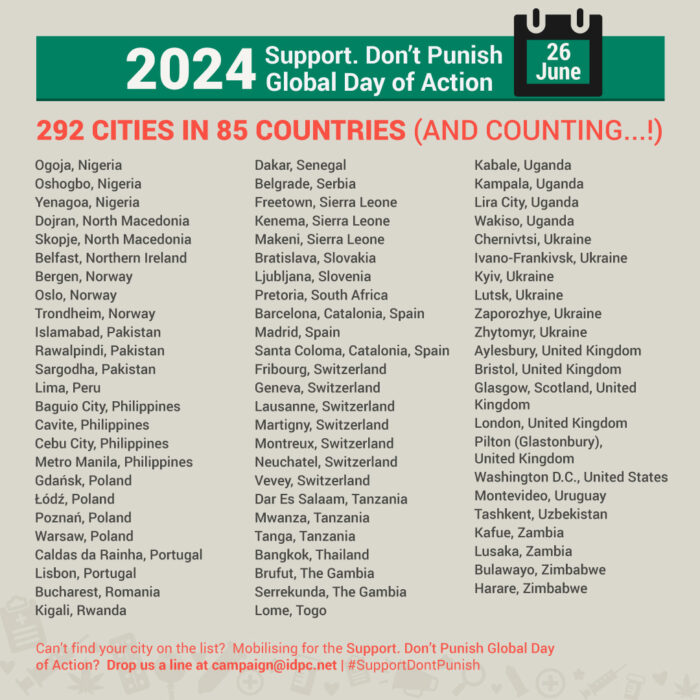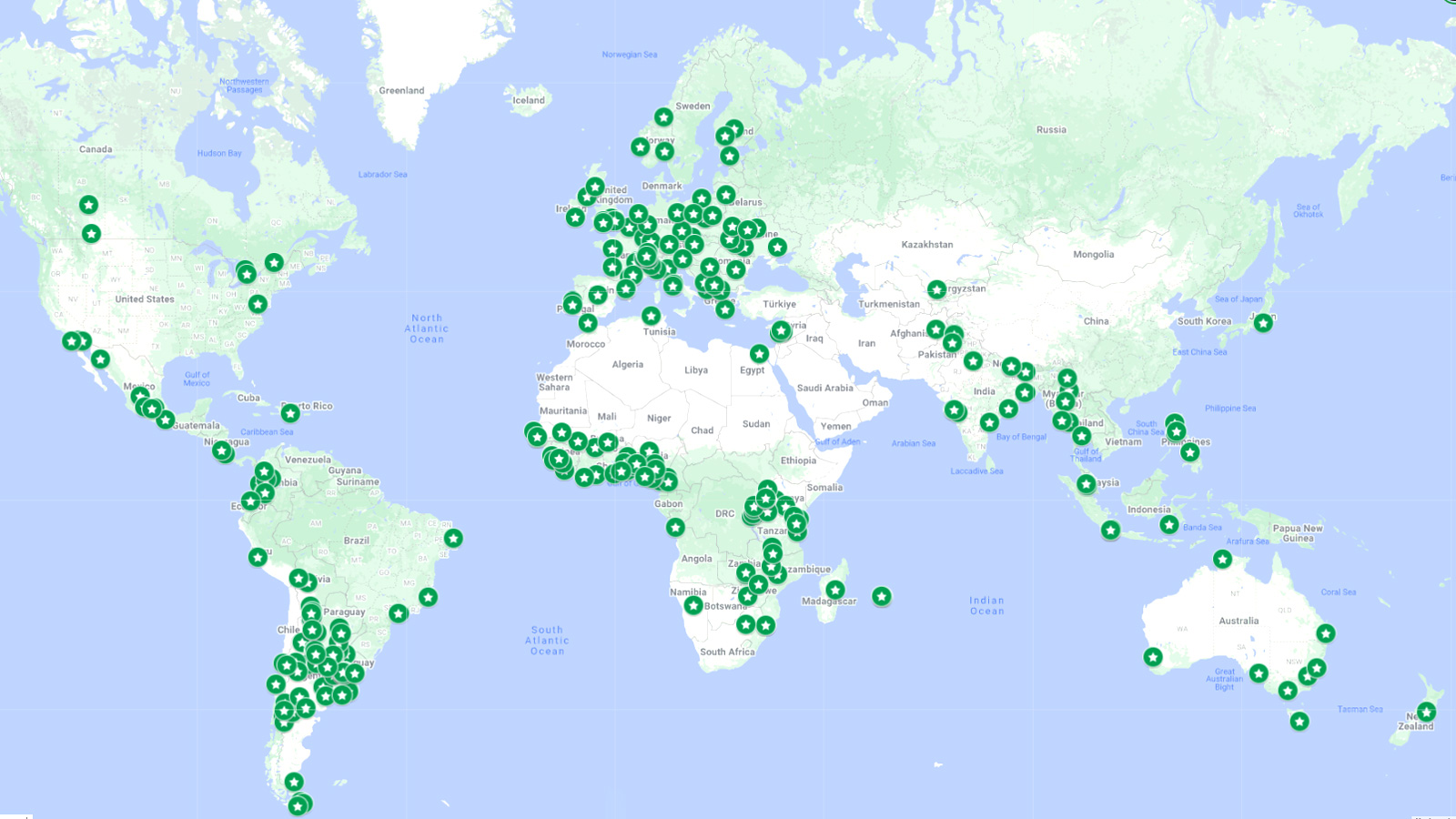By Juan Fernández Ochoa (IDPC Campaigns & Communications Officer)
The 12th Support. Don’t Punish Global Day of Action comes at a crucial moment in the global harm reduction landscape. Commemorated around June 26th — historically marked with a punitive tone — our day of mobilisation promotes care in the community, and respect for human dignity and autonomy. Thousands of campaigners across over 290 cities in 84 countries will unite in transnational solidarity, through local and national transformative actions that build sustainable alternatives to the harmful ‘war on drugs’.
Mobilising under a common banner, campaigners employ an ever-growing toolkit to effect change, including by sparking political dialogue. In Lebanon, for instance, Skoun is leading a coalition to further strengthen strategic alliances in parliament toward urgent drug law reform. While miles away, in the Colombian Amazon, AlaOrillaDelRío will collaborate with coca-growing communities and local officials to seek solutions to unmet health and harm reduction needs.
Many activities also seek to strengthen communities’ capacity and resilience. LBH Masyarakat, in Indonesia, will foster dialogue with communities affected by punitive drug policies on stigma reduction and reform, alongside providing access to legal support services. Creatively, in Cameroon, ACRDR is organising a football match between people who use drugs and community members to promote harm reduction and mutual understanding in a convivial setting.
Shifting narratives to change the balance in public opinion is equally a fundamental focus in our efforts. With this in mind, Y-Fem in Namibia is using social and legacy media to advocate for reform and specialised services for women and people of diverse gender identities who use drugs. Meanwhile, ARAS in Romania is convening a range of stakeholders to raise awareness, both online and offline, about the country’s declining harm reduction infrastructure.
As we work to change local and national discourses, policies and practices, recent international developments affirm our movement’s purpose. In September 2023, the UN human rights chief released a seminal report on the human rights impacts of drug policies, urging transformative approaches anchored in harm reduction, decriminalisation and responsible regulation. Echoing this, the UN expert on the right to health highlighted the compounding harms of criminalisation and drug law enforcement on marginalised communities. Notably, the UN Commission on Narcotic Drugs recently included ‘harm reduction’ in a resolution for the first time in history.
In our cities and countries, harm reduction and drug policy reform developments also spell progress. Over the past five years, six countries have adopted some form of decriminalisation, bringing the total to 66 jurisdictions across 40 countries. Harm reduction provision continues to grow, with opioid agonist therapy now available in Egypt (elevating the total to 88 countries), and safer consumption sites operational in 17 countries.
Despite these positive moves, challenges persist. The ‘war on drugs’ remains the dominant paradigm worldwide, fueling stigma, state violence, and informal drug markets in a state of constant and dangerous flux. Problematically, the UN agency responsible for drug-related issues continues to prioritise such an approach — in complete disconnect with the rest of the UN system. And so the World Drug Report 2024, launched today by the UN Office on Drugs and Crime, sheds light on the booming trade of cocaine, amphetamine-type stimulants and synthetic opioids without once questioning the devastating impacts of drug policies on the health, rights and safety of people worldwide. Indirectly, the data in the report does remind us of our communities’ vulnerability to the consequences of punitive drug policies, as exemplified by the North American drug deaths catastrophe. In response to this crisis, community-led initiatives like the Drug User Liberation Front have rallied for and tentatively provided a safe drug supply — yet they’re prosecuted, not protected, for their life saving work.
Other intersecting crises endure with dire consequences for our people. The burden of the HIV epidemic continues to heavily fall on the shoulders of people who inject drugs — an injustice often pegged onto them, instead of the people in power who fail to provide essential harm reduction services in an enabling environment. Recent re-criminalisation efforts in North America also highlight how moral panics on drug use and economic precariousness have been weaponised to implement lethal policy rollbacks. Shockingly, over the past decade, states retaining the death penalty have killed over 3,113 people for drug offences, tainting the response to drugs with cruelty when it should be rooted in compassion.
In navigating these obstacles, our global struggle against the ‘war on drugs’ is more important than ever, and must leverage shared learning and cross-movement solidarity. We have a treasure trove of experiences in the over 2,300 activities organised by Support. Don’t Punish campaigners through the years. Whether it is grassroots community-building, parliamentary advocacy, or media training, we can be inspired by impactful actions across different contexts. Beyond our campaigning, the history of the harm reduction movement has a wealth of lessons to offer in terms of tactics — from protest and civil disobedience, to building strategic and principled alliances, to practical experiences in mutual aid. This learning is crucial as we confront a troubling global trend toward intensifying securitisation, repression and the erosion of civic freedoms.
Beyond learning from each other, we can also learn from sister movements’ histories and legacies. The civil rights movement’s use of nonviolent resistance, the self-support networks weaved by queer and trans communities facing heteropatriarchal violence, and the sex workers’ movement demand for full decriminalisation, just to pick a few, all offer insights on how to steadfastly resist damaging apparatuses of punishment and criminalisation. This wealth of knowledge calls for breaking down silos between our movements and recognising that intersecting oppressions demand collective solidarity.
We don’t live single-issue lives. And our struggle should reflect that. Which is why building bridges with gender, racial, Indigenous, migrant and disability justice movements, to name a few, is critical. By amplifying each other’s voices and strengthening collective resistance, we can challenge not only the ‘war on drugs’ but also the wider systems of oppression that it feeds off and fuels.
Finally, as we bring about reform and redress, we must remain vigilant against co-optation tactics that only superficially address our demands whilst reinforcing punitive systems — a phenomenon that has been termed ‘carceral humanitarianism‘. Our vision of collective liberation must be at the very least sceptical about half-measures, in favour of genuine justice – of the kind that is possible when no one is left behind.
Support. Don’t Punish!
